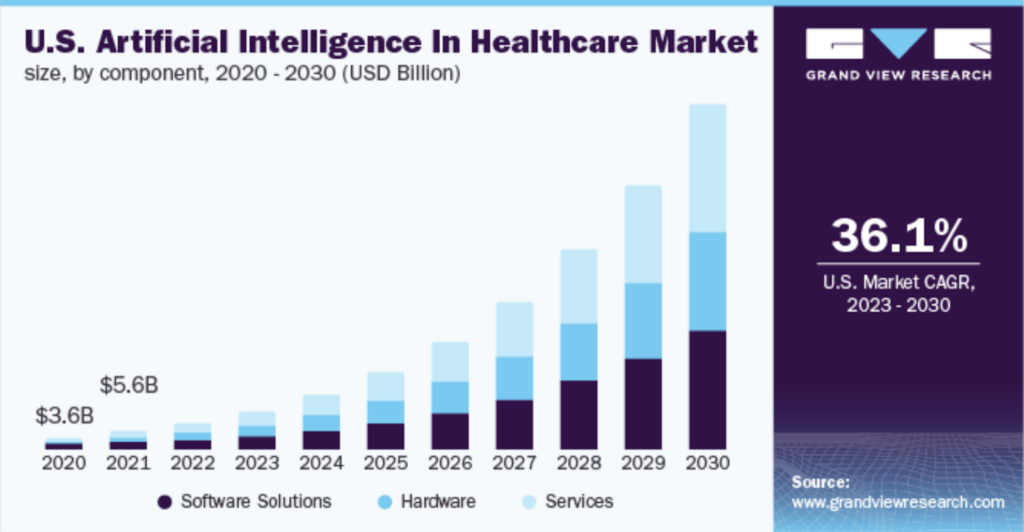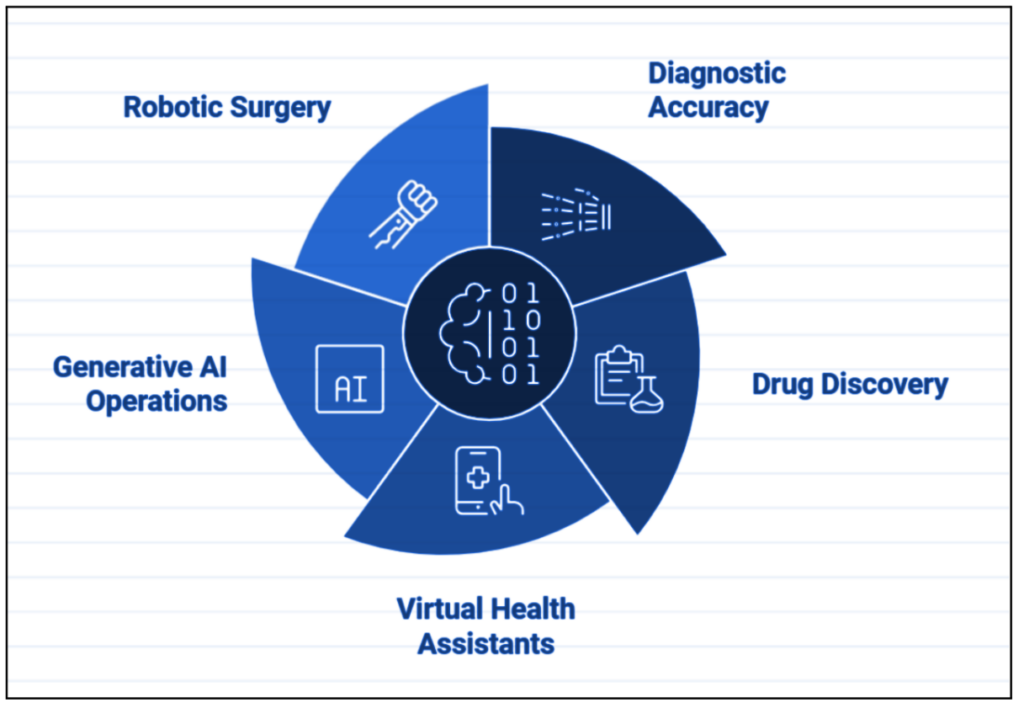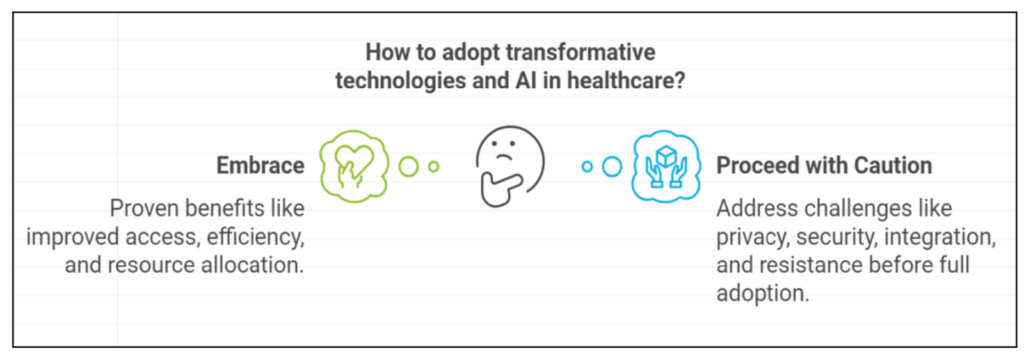Have you noticed how artificial intelligence (AI) is becoming a game-changer in diagnosing, treating, and caring for patients?
With AI technologies advancing quickly, isn’t it crucial for healthcare professionals, researchers, and patients to stay updated on the latest trends?
This blog will explore groundbreaking AI trends that are reshaping healthcare, discussing the significance of each trend, how AI is driving its implementation, and providing real-world examples of its impact.
Are you ready to discover how AI is transforming the healthcare landscape?
Exploring the Role of AI in Healthcare
AI is increasingly used in healthcare, applying machine learning (ML) algorithms and cognitive technologies to analyze medical data, predict outcomes, and assist in diagnosis and treatment planning. This technology enables medical professionals to deliver more accurate diagnoses and create tailored treatment strategies.

AI also helps analyze large datasets to develop preventive care recommendations, optimizing hospital workloads and reducing costs.
Despite the challenges of AI in healthcare, the global AI medical market is projected to grow from $20.9 billion in 2024 to $148.4 billion by 2029, reflecting a remarkable compound annual growth rate (CAGR) of 48.1%; it’s clear that AI is transforming the healthcare landscape.
Healthcare and AI: Statistical Insights
There has been a significant surge in the integration of artificial intelligence (AI) within the healthcare sector.
According to a report in GrandViewResearch, the global AI market in healthcare was estimated at USD 22.45 billion in 2023 and is expected to grow at a compound annual growth rate (CAGR) of 36.4% from 2024 to 2030.

A National Institutes of Health (NIH) study found a 400% increase in research on AI applications in medicine since 2019. Furthermore, a 2024 Ibexweb report predicts that 90% of hospitals will use AI for early diagnosis and remote patient monitoring by 2025.
These statistics indicate that AI rapidly transforms healthcare and changes how we provide and experience medical care.
Cutting-Edge AI Applications in Healthcare for 2024
As we enter 2024, artificial intelligence (AI) is reshaping the healthcare industry with innovative solutions that enhance patient care and improve diagnostic accuracy. From predictive analytics to personalized treatment plans, AI applications transform how healthcare providers tackle challenges.
To better understand this impact, let’s look at real-world examples of how AI already makes a difference in healthcare.

Enhancing Diagnostic Accuracy with AI
Shortcomings in imaging diagnosis can seriously threaten healthcare quality and safety. About 12 million outpatient diagnostic errors occur each year in the U.S., half of which could cause harm.
Artificial intelligence (AI) has emerged as a vital tool for addressing this issue, especially in X-ray imaging. One notable example is VinBrain’s Oncology Diagnosis and Treatment (D&T) system, which helps screen for and detect early signs of liver and colorectal cancers.
This AI solution uses advanced techniques to analyze CT images, significantly improving the efficiency of oncologists. Misdiagnosis is a major concern, contributing to an estimated 371,000 deaths and 424,000 permanent disabilities in the U.S. annually. AI can analyze medical tests, like MRI scans, in seconds, facilitating faster and more accurate diagnoses.
For instance, it can detect early signs of diabetic retinopathy from eye images, allowing for timely treatment. Tools like Google Health are also enhancing breast cancer screenings by using AI to interpret mammograms, showcasing the potential of AI to transform the diagnostic process and improve patient outcomes.
Transforming Drug Discovery with Artificial Intelligence
Traditionally, developing new drugs has been a slow process, often taking over 10 years and costing billions of dollars, with 90% of drugs failing in clinical trials. However, AI is revolutionizing this field by quickly analyzing vast amounts of data, such as chemical structures and disease information, to rapidly identify promising drug candidates.
This is especially important for diseases that urgently need new treatments. Companies like Insilico Medicine are already using AI to create therapies for severe lung diseases. AI not only speeds up traditional drug discovery methods but also enables the design of targeted therapies and new uses for existing medications.
Recursion has developed a massive dataset of over 50 petabytes of cell images, allowing them to conduct extensive lab work in just 15 minutes, achieving a PhD’s worth of research in that time. With Nvidia’s supercomputer, Recursion can discover new drugs three times faster and at 2.5 times less cost than the industry average.
However, experts emphasize that ongoing research and collaboration between AI specialists and pharmaceutical scientists are essential to fully harness AI’s potential in drug discovery.
The Impact of Virtual Health Assistants and Chatbots
Virtual assistants and chatbots offer automated, conversational interfaces that significantly improve patient interactions and reduce the workload for frontline healthcare staff. Available 24/7, these virtual assistants can answer common questions, schedule appointments, and provide educational resources, enhancing access to care and the overall patient experience.
It’s estimated that AI-driven chatbots could save healthcare organizations $3.6 billion worldwide, while AI-powered nurse aides might save $20 billion annually by reducing the 20% of time nurses spend on patient maintenance duties.
These chatbots can evaluate patient symptoms and direct them to the appropriate resources, making healthcare more efficient and accessible for everyone.
Streamlined Healthcare Operations with Generative AI
Generative AI is improving clinical applications and significantly reducing administrative burdens in healthcare settings. According to Accenture, AI has the potential to enhance 40% of healthcare providers’ working hours.
So, how does generative AI improve operational efficiency? It can transcribe and summarize patient consultations, fill electronic health record (EHR) fields, and generate clinical documentation.
Additionally, AI optimizes appointment scheduling by analyzing patient needs and doctor availability, creates personalized appointment reminders and follow-up emails, and reviews medical insurance claims to predict rejections.
For instance, a study published in Mayo Clinic Proceedings showed that surgeons using a large language model (LLM) could produce high-quality clinical notes in mere seconds, a task that typically took seven minutes. This represents an 84-fold increase in efficiency, benefiting both patients and physicians by streamlining workflows and enhancing care delivery.
AI and the Evolution of Robotic Surgery
Surgeons are no longer alone in the operating room, as AI and robotics rapidly transform surgery. According to the American College of Surgeons, this technology enhances precision, efficiency, and patient outcomes.
AI analyzes patients’ medical histories, scans, and genetic data to recommend the best surgical approaches and personalize treatment plans. During surgeries, AI provides real-time guidance and automates repetitive tasks, minimizing human error and allowing surgeons to focus on critical decisions.
AI-based surgical systems can highlight tools, monitor activities, and issue alerts tailored to each patient’s needs, particularly in endoscopic and robotic surgeries. Dr. Tignanelli notes that AI can analyze surgeries as they happen and assist in decision-making by identifying issues such as abnormal cell proliferation.
While AI can perform simple tasks like closing incisions, most experts agree that entirely replacing human surgeons with AI-controlled robots is unlikely. Instead, AI will continue to enhance the decision-making and performance of human surgeons, making surgeries safer and more effective.
If you want to read more, check this out: 15 Ways AI is Being Used in Healthcare
Advantages and Challenges of Transformative Technologies and AI

Advantages
- Improved Patient Access to Care: Technologies like telemedicine and AI help patients get care more efficiently. They allow healthcare workers to reach more people, make administrative tasks smoother, and provide support anytime, day or night.
- Increased Efficiency in Healthcare Delivery: Transformative technologies and AI make healthcare work better. They help reduce repetitive tasks and improve how resources are used, making healthcare faster and more cost-effective.
- Better Resource Allocation: Tools like predictive analytics and AI help healthcare organizations use their resources wisely. They can predict how many staff members are needed and match their skills to what patients require, leading to better patient care.
Challenges
- Privacy and Security Concerns: Using new technologies raises worries about keeping patient data safe. Healthcare organizations must protect this information and follow laws like HIPAA to maintain trust.
- Integration with Existing Systems: Combining new technologies with old systems can be hard. It takes careful planning and investment to ensure everything works together without causing problems.
- Resistance from Healthcare Professionals: Some healthcare workers may be hesitant to use new technologies. They might worry about losing their jobs or not being able to use digital tools. To ease these concerns, organizations need to provide proper training and support.
Final Insights on AI and Technological Change
As we look ahead to 2024, it’s crucial for healthcare businesses and leaders to understand how powerful AI technologies can change the industry. AI is already making waves with personalized medicine, predictive analytics, remote patient monitoring, and drug discovery, improving how healthcare is delivered and patients’ results.
By embracing these innovations and investing in AI solutions, organizations can stay ahead in a rapidly changing landscape, boost efficiency, enhance patient care, and create value for everyone involved in healthcare.

Hello! Do you know if they make any plugins to assist with Search Engine Optimization? I’m trying to get my blog to rank for some targeted keywords but I’m not seeing
very good success. If you know of any please share.
Appreciate it! I saw similar text here: Eco bij